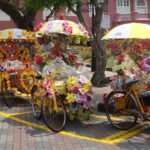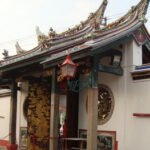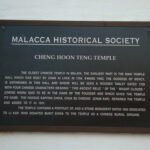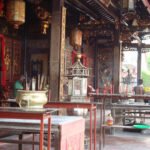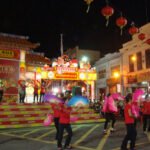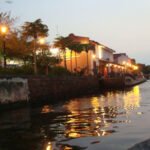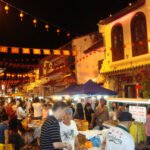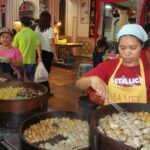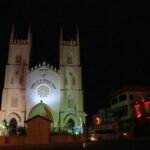Two Backpacks
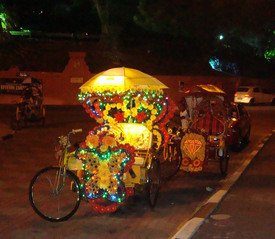
Chapter 25 - We don't have to do anything. We've retired!
‘You know, we don’t have to do anything if we don’t want to. We’re retired,’ Ron comments.
I’m searching the internet again. I’ve been fretting for weeks over what we should do between mid-December and March when we’re due in Singapore for our flight back home to the UK. And you know, Ron’s right, we don’t.
Since leaving school, I’ve worked as a mother, secretary, shipbroker, English teacher and road builder. I’ve never had the opportunity to do nothing. I panic when I find myself with a free morning, reverting to dusting, washing laundry or trying out new recipes to fill my time.
Now, aged sixty and retired, and with all the time in the world, I’m struggling. Being busy is ingrained into my DNA. Booking hostels and transport, planning visits for the next leg of our trip has kept my brain engaged.
We crossed into Thailand from Houie Xie, Laos, without mishap and are now in Chiang Mai. It’s early December. Christmas is on the horizon; hotels are expensive and filling up fast.
‘We’ve got to decide today, Ron. If we don’t, we’ll have to pay a fortune for a room anywhere in Thailand,’ I state as I click on another hostel site.
‘You’re right. I’ve been checking hostels too. We should have thought about making a booking earlier. Let’s keep looking for another hour and see what we can find,’ suggests my other half as he returns his attention to his computer screen.
Sixty minutes later, we give up and decide to go for a stroll. I love Chiang Mai, with its beautiful ancient temples, mountainous landscape and the many lanes where cafes abound.
We find a café serving lassis and bagels. Seated outside at a small table in the shade of a large umbrella, we people watch for a while.
‘What about renting an apartment?’
‘Where’s that come from?’ I ask. ‘What made you think about renting?’
‘It’s just that we’ll blow our budget big time if we book a hotel for Christmas. We’ve done well this year and kept to the budget. It’d be a shame to go mad now.’
Secretly, I’d been looking forward to a bit of luxury over Christmas. But Ron’s right. We don’t know how long our trip will be or how our money will last once we leave the relatively cheap countries of Southeast Asia.
‘Okay. It’s an idea. But where will we find somewhere that’s in our price range?’ I ask
‘Leave it to me. I’ll have a look online when we get back. See what I can find,’ offers Ron.
We spend the afternoon and evening exploring, visiting Wat Chedi Luang Varavihara, an impressive temple built in the 14th century situated in the centre of the Old City. The eighty-foot-tall chedi was partly destroyed in an earthquake in the 16th century; beautifully crafted stone elephants surround the remains of the chedi, guardians of the temple.
‘It’s so peaceful here. Let’s have a seat for a while, Ron.’
We find a bench in the shade and sit. An overwhelming sense of calm washes over me as I give myself over to a feeling of contentment.
I’ve no idea how long we’re there, but when we both get up to leave, it’s evident Ron’s felt the magic too. He’s more relaxed than I’ve seen for weeks.
‘Let’s enjoy Thailand for a little longer,’ he suggests as we walk to the night market to find our supper.
***********
Ron’s idea to find a two-month rental apartment has paid off. We’re living in a lovely apartment in Jomtien, a town on Thailand’s east coast, about two hours from Bangkok.
During our two-month stay, we make friends with several expats, one of whom takes us to a par three golf course. I’ve missed playing golf, a sport I took up when living in Australia. Ron and I become regulars.
Days are lazy and relaxed, sunbathing by the pool, a game of golf and supper at a wonderful nearby restaurant called Mags.
Some evenings we take the bus into Pattaya, ten minutes away. From six o’clock onward, Walking Street, famous for its bars, restaurants and clubs, comes alive. Neon signs advertising go-go bars, massage parlours and nightclubs flash their messages overhead while coloured lanterns crisscrossing the street dance in the evening breeze.
The evening is also the time when the ladyboys come out onto the street, dressed in their finery, encouraging passers-by into their club. There’s no way you’d know the beautifully dressed and manicured ladyboys are male.
Deciding to take in one of the shows, we buy our tickets and enter the club. The audience waits in anticipation in the crowded room as the lights dim. Dancers enter the stage dressed in exotic, colourful costumes. We watch spellbound as the ladyboys strut their stuff, and we join in the applause when the act finishes.
There is also an act involving ping-pong balls. Suffice it to say; there’s no way I could achieve such feats with those tiny white balls!
**********
In early February 2010, we return to Bali. After the sudden death of my friend Bernie, I’d worried about his wife and my good pal, Shirley. I used a travel voucher I’d received as a gift on leaving my job in Australia to pay for her flight to Bali, a chance for her to relax and for us to spend a few days together.
From the moment she arrives, we don’t stop talking! Unfortunately, Ron has been suffering from a flu/cold bug, which he passed to me. It means all I want to do for a few days is sleep – which isn’t much fun for Shirley!
Ultimately, I have to call a doctor; my temperature is high, and my chest is infected. A course of antibiotics does the trick, and I’m back on my feet within two days.
To make up for being a rotten pal and leaving Shirley on her own, I book a private tour for a day that takes us to Tanalot and Bedugul. Our final stop is in Ubud, where I’ve booked us both into a spa (the same one Ron and I had enjoyed almost a year before).
All too quickly, it’s time to say goodbye again. We had a wonderful week together and made new memories that will keep us close for years.
**********
It’s early March, and the weeks are flying by.
Ron and I are staying at Baba House, a hotel in Malacca’s Chinatown. The vibrant area has fabulous eateries, narrow lanes and colourful shops to explore. Plus, the food is delicious and cheap!
We again used Air Asia for our flight from Bali to Kuala Lumpur and then caught a bus to Malacca after a night in the Tune hotel.
Malacca has a colourful history. Lucrative trading routes with Arabia, India and China were shattered in the early 1500s when the Portuguese arrived and overran the port and surrounding area. The Dutch then routed the Portuguese in 1641 and ruled until 1798.
The area was ceded to the British in the Anglo-Dutch Treaty of 1824 in exchange for the British possession of Bencoolen and British rights in Sumatra. Malacca remained under British rule until Malaya was granted independence in 1957. In 1963, Malaya, Sabah, Sarawak, Singapore and Malacca merged to form Malaysia.
The city’s history is reflected in various sites around the city, including the red-painted Dutch Studthuys building on Red Square, once the home of the Dutch Governor General.
‘Let’s go and wander,’ I suggest once Ron and I finish breakfast. It’s our first full day in Malacca, and I’m keen to look around.
The sun’s shining as we step from our hotel, but already the air is heavy with humidity.
‘Look at those becaks! They’re so pretty.’ I exclaim, as rounding a street corner, I see replicas of the tri-wheeled bicycles I’d used while living in Indonesia.
The becaks stand on the shaded side of the street, each decorated with flowers and fairy lights, a large parasol providing welcome shade from the day’s sunshine.
‘Let’s take a ride. It’ll be easier than walking. Maybe the driver can take us around the city?’ suggests Ron.
Our driver is happy to act as our guide for an hour. We sedately traverse narrow side streets and see some popular tourist sights.
We alight at a square, drawn by mouth-watering aromas wafting on the light breeze. Along one side of the square, women are setting up food stalls. Giant woks sit on benches laden with seafood, chicken and pork skewers.
‘Come on, let’s wander and come back for something to eat later,’ suggests Ron.
We walk to the canal. ‘You could almost be walking along the banks of a river in an English village if it wasn’t for this heat,’ I comment, stopping in the shade of one of the buildings.
‘Maybe,’ replies Ron.
I can tell from his lack of enthusiasm that he’s had enough of sightseeing. ‘C’mon, let’s head back to the square and find something for lunch,’ I suggest.
We spend the following days wandering around the town, taking in the Saturday night market on Jonker Street and joining an impromptu dancing session with the Chinese locals. We also visit the Cheng Lock Museum and St Francis Xavier church.
On our last evening in Malacca, we decide to take a boat trip along the canal -lights twinkle from the nearby cafes and restaurants, images reflected in the canal’s waters. The effect is breathtaking, as if the canal’s surface has come alive with hundreds of dancing lights.
We alight near the coast and walk to the sluice gates that separate the canal from the ocean.
Leaning on the railing, thoughts of my time as a shipbroker in London return.
‘Did you know I once ‘lost’ a ship to piracy?’
Ron, who’d been gazing at the passing shipping, turns to me, a surprised look on his face.
‘You lost a ship? How?’
‘There have always been pirates on these seas,’ I state. ‘Back when I worked in London, piracy was rife, especially here. I’d chartered a ship to sail to Australia to pick up cargo for ICI (Imperial Chemical Industries). It entered the Malacca Straights but disappeared. It’s thought that pirates boarded the ship, dumped the crew overboard and sailed the ship up one of the many inlets where they scrapped her. The authorities never found the ship. I had my leg pulled for a long while after that.’
‘Wow! That’s some story!’
Thoughts of the crew flash through my mind; questions of their demise are still not answered. I give myself a mental shake. ‘It was a long time ago. I’m sure it’s safer now.’
‘Good job we’re flying home,’ comments Ron, as he takes my hand.
